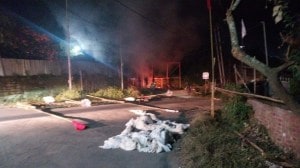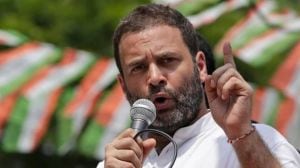How they steal minutes
Siddharth Ray, CEO of international long distance (ILD) firm Data Access, is fuming.He is losing business worth crores to illegal companies ...

Siddharth Ray, CEO of international long distance (ILD) firm Data Access, is fuming.
He is losing business worth crores to illegal companies who are diverting incoming international calls to the local BSNL and MTNL networks (and foxing computers to make international calls look like local calls). He says they are robbing precious business that actually belongs to him.
It’s quite simple really. All an illegal operator has to do is buy some computers and lease some telephone connections from BSNL/MTNL. Then, he must erect an illegal gateway in the name of international data circuit or for internet connectivity.
And he’s ready for business from a 500 square feet office! “The margin for illegal operators is created by the short sightedness of our regulator TRAI,” says Ray. The biggest losers are ILD operators like VSNL and Data Access because their valuable long distance incoming traffic is simply being hijacked by illegal operators through leased lines and passed on as local calls to fixed-line operators.
The Modus Operandi
It is astonishingly simple: An ILD operator like VSNL or Data Access carries a lot of international long distance voice traffic to India through their networks which terminate on either MTNL or BSNL lines.
Now, the rates paid by the ILD operators for terminating their long distance traffic on these local networks is Rs 5.50 a minute. But BSNL and MTNL provide subsidised call charge to their retail customers, who use the normal land line, of Rs 1.20 per three minutes. So, if a long distance call is terminated as a local call, margins can be as high as Rs 5.20 per minute.
In other words, phone calls from abroad come via internet or through leased lines, but MTNL and BSNL’s computers are foxed into believing that it’s just a local call. End result? The leased line operator robs both ILD operators like VSNL of precious incoming business, and BSNL/MTNL of extra funds.
‘‘We lose business worth Rs 500 crore a year. In turn, BSNL/MTNL also lose at least Rs 400 crore which they would have got from us for termination charges at Rs 5.50 per minute,’’ says Ray.
He pegs the total number of hours stolen at a whopping one billion minutes a year, about 30 per cent of the legitimate market.
Considering VSNL’s revenue in fiscal 2002 was Rs 65,081 crore, the loss could be equivalent to about a month’s revenue. “This is a very sensitive issue,” says S.K. Gupta, MD of VSNL, refusing to divulge details. Sources add: ‘‘India is too vast a country for policing. The only solution is to take out the margin for illegal operation by reducing gap between ILD termination rates and normal call charges.”
Besides ILD firms, BSNL and MTNL lose out too because calls terminate as local and not international calls. According to a BSNL official, there are mainly two ways in which these calls are lost. First, the illegal operator provides the interested party some specific number and every time the interested party calls (through a BSNL/MTNL landline), they directly uplink the calls via satellite to the US.‘‘As a result they don’t use either BSNL or VSNL gateways, and we both lose,’’ the official says. Second, the illegal operator, sitting in some remote corner—usually a rural area (mostly in Andhra Pradesh villages)—takes atleast two lines from a rural junction extension (junctions are connecting points between two exchanges and they don’t have call meters to measure the duration of calls here).
Every time the interested party calls on one line, the operator uses the second line to connect the calls abroad via VSNL’s gateway. This not only tricks the local BSNL exchange, where the call does not get registered because it is via the junction, but also slips past the district TAX, present in each district. ‘‘In the second case, BSNL loses but not VSNL and thus our revenues suffer’’ adds the official. Because, only 3% of the total calls are actually long distance. “It becomes difficult for us to monitor calls,” says a BSNL official.
Blame it on ancient laws
‘IT-enabled’ company officials say that with rapid changes in telecom sector technology, the system that tries to bar them from getting into ILD calls is an outdated one. “The government rule of getting the approval for operating call centers using international private leased circuits (IPLC) is obsolete and is not changing with the times,” says an official of a call centre, seeking anonymity.
The DoT brought in this rule when the call centre industry began to grow in India primarily to protect their revenues from ILD calls. “This rule was sensible in those days when the government had monopoly in all telecom services in India and hence government wanted to take steps to prevent misuse of making ILD calls using cheaper IPLC circuits. Now, this rule is obsolete,” the official adds.
He says that the government no longer has monopoly over ILD calls and there are licensed ILD operators like Data Access and Bharti who take their share of ILD revenue. Besides, VoIP is legal now. “A major percentage of international calls have now been switched to VoIP. Voice over internet protocol is now available for every Indian in the street. ILD revenue is no longer the prerogative of the government. If call centres can use VoIP without any approval, why not use International Private Leased Circuits (IPLC are basically bandwidth for global communications networks. These point-to-point private line services are dedicated to the customer’s exclusive use)” he asks.
Though a consumer is not at all affected by this debate, it will not be long before TRAI steps in to judge on the debate. Till then, happy calling!
With inputs from Dev Chatterjee
Photos




- 01
- 02
- 03
- 04
- 05



























